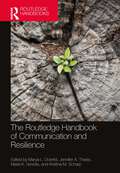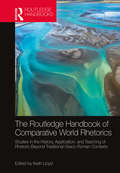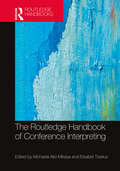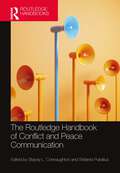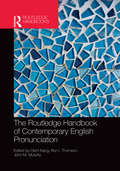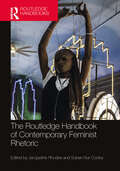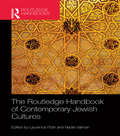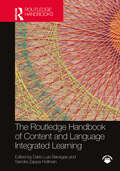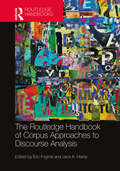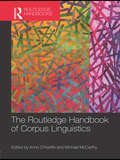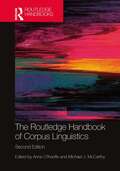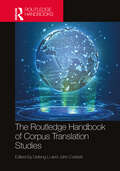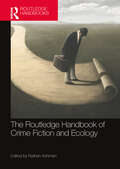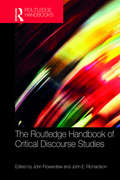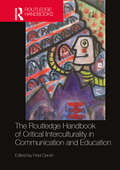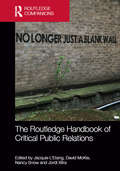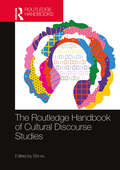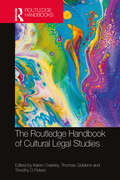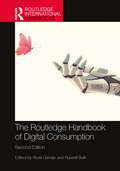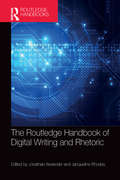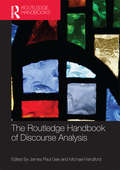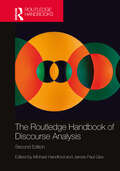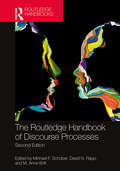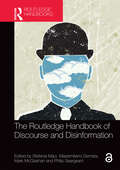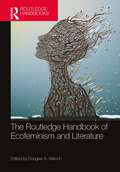- Table View
- List View
The Routledge Handbook of Communication and Resilience (Routledge Handbooks in Communication Studies)
by Kristina M. Scharp Marya L. Doerfel Maria K. Venetis Theiss, Jennifer A.Drawing on expertise from communication scholars who examine resilience within and across individual, relational, group/team, organizational, inter-organizational, and community levels, this handbook provides a wide-ranging resource for theory building, empirical investigations, and practical applications.Chapters in this handbook bring awareness to how resilience is constituted through human communication processes. As a baseline, Part I begins with chapters that explicate and conceptualize resilience as a process that shapes and reflects communication behavior at multiple levels. In Part II, chapters focus on micro communication processes in the enactment of resilience at an interpersonal level in domains such as close relationships, families, and small groups. In Part III, attention shifts toward examining resilience processes in professional domains within and among organizations. Part IV considers macro communication processes, looking at how communities can build resilience, sustainability, and engagement through communal activities that cultivate strong networks and promote the health and safety of the community All chapters feature a discussion of practical implications for policy investments and/or interpersonal interventions for building and maintaining sustainability and resiliency.This handbook is a useful resource for scholars and advanced students in communication studies, social psychology, sociology, human development, public policy, and family sciences.
The Routledge Handbook of Comparative World Rhetorics: Studies in the History, Application, and Teaching of Rhetoric Beyond Traditional Greco-Roman Contexts
by Keith LloydThe Routledge Handbook of Comparative World Rhetorics offers a broad and comprehensive understanding of comparative or world rhetoric, from ancient times to the modern day. Bringing together an international team of established and emergent scholars, this Handbook looks beyond Greco-Roman traditions in the study of rhetoric to provide an international, cross-cultural study of communication practices around the globe. With dedicated sections covering theory and practice, history, pedagogy, hybrids and the modern context, this extensive collection will provide the reader with a solid understanding of: how comparative rhetoric evolved how it re-defines and expands the field of rhetorical studies what it contributes to our understanding of human communication its implications for the advancement of related fields, such as composition, technology, language studies, and literacy. In a world where understanding how people communicate, argue, and persuade is as important as understanding their languages, The Routledge Handbook of Comparative World Rhetorics is an essential resource for scholars and students of communication, composition, rhetoric, cultural studies, cultural rhetoric, cross-cultural studies, transnational studies, translingual studies, and languages.
The Routledge Handbook of Conference Interpreting (Routledge Handbooks in Translation and Interpreting Studies)
by Michaela Albl-MikasaProviding comprehensive coverage of both current research and practice in conference interpreting, The Routledge Handbook of Conference Interpreting covers core areas and cutting-edge developments, which have sprung up due to the spread of modern technologies and global English. Consisting of 40 chapters divided into seven parts—Fundamentals, Settings, Regions, Professional issues, Training and education, Research perspectives and Recent developments—the Handbook focuses on the key areas of conference interpreting. This volume is unique in its approach to the field of conference interpreting as it covers not only research and teaching practice but also practical issues of the profession on all continents. Bringing together over 70 researchers in the field from all over the world and with an introduction by the editors, this is essential reading for all researchers, trainers, students and professionals of conference interpreting.
The Routledge Handbook of Conflict and Peace Communication (Routledge Handbooks in Communication Studies)
by Stefanie Pukallus Stacey L. ConnaughtonThis handbook provides a comprehensive review of research in conflict and peace communication and offers readers a range of insights into foundational, ongoing, and emerging discussions in this field.The volume brings together peace studies, conflict studies, and communication studies to acknowledge the power of communication—both cooperative, solidarizing, and integrative as well as destructive and divisive—in constituting social relations. It features a multiplicity of authors, including academics and practitioners from all corners of the globe and from across the communicative spectrum. The handbook is divided into four parts: (1) Meta-theoretical, theoretical, and methodological approaches in conflict and peace communication research; (2) Conflict communication; (3) Peace communication; and (4) Cross-cutting and emergent themes.This handbook is essential reading for scholars, research-driven practitioners, graduate-level students, and upper-level undergraduate students in conflict and peace communication within disciplines such as communication studies, political science, international relations, security studies, and human rights.
The Routledge Handbook of Contemporary English Pronunciation (Routledge Handbooks in English Language Studies)
by Okim Kang Ron I. Thomson John M MurphyThe Routledge Handbook of Contemporary English Pronunciation provides a comprehensive survey of this field covering both theoretical and practical perspectives on pronunciation. In 35 chapters contributed by leading scholars from around the world, this Handbook examines: linguistic and historical background of sound systems and theoretical issues linked to sound changes; pronunciation acquisition and factors related to speech production; pronunciation research and applications to second language pronunciation; the link between pronunciation and other language skills including perception and other socio-cultural factors; pronunciation and its relation to World Englishes. The Routledge Handbook of Contemporary English Pronunciation will be essential reading for anyone with an interest in pronunciation.
The Routledge Handbook of Contemporary Feminist Rhetoric (Routledge Handbooks in Communication Studies)
by Jacqueline Rhodes Suban Nur CooleyThe Routledge Handbook of Contemporary Feminist Rhetoric explores the histories, concerns, and possible futures of feminist rhetorical work in the late 20th and early 21st centuries.Featuring work from scholars across disciplines, this book explores where we have been, where we are, and where we might be going. Forwarding key areas of study in feminist rhetoric, the handbook is divided into five interrelated sections—Time: Discovering, Recovering, and Composing our Histories; Space: Setting and Testing Boundaries: Physical and Digital Locales; Movement: Exploring Activism, Migration, and Globalism; Being: Celebrating (and Insisting on) Embodied Praxis; and Becoming: Transforming Hopes into Feminist Practice. Throughout the handbook, contributors survey and document the critical work of feminist rhetoric, pointing to ongoing interests in history, politics, and activism while showcasing new lines of inquiry and new methods of analysis, critique, and intervention.The first of its kind, this accessibly written handbook will be an indispensable resource for scholars and researchers in the fields of rhetoric, writing studies, communication studies, and women’s and gender studies.
The Routledge Handbook of Contemporary Jewish Cultures (Routledge Literature Handbooks)
by Nadia Valman Laurence RothThe Routledge Handbook to Contemporary Jewish Cultures explores the diversity of Jewish cultures and ways of investigating them, presenting the different methodologies, arguments and challenges within the discipline. Divided into themed sections, this book considers in turn: How the individual terms "Jewish" and "culture" are defined, looking at perspectives from Anthropology, Music, Literary Studies, Sociology, Religious Studies, History, Art History, and Film, Television, and New Media Studies. How Jewish cultures are theorized, looking at key themes regarding power, textuality, religion/secularity, memory, bodies, space and place, and networks. Case studies in contemporary Jewish cultures. With essays by leading scholars in Jewish culture, this book offers a clear overview of the field and offers exciting new directions for the future.
The Routledge Handbook of Content and Language Integrated Learning (Routledge Handbooks in Applied Linguistics)
by Darío Luis BanegasContent and language integrated learning (CLIL) is an increasingly popular educational approach given its dual focus on enabling learners to acquire subject- matter through an additional language, while learning this second language in tandem with content. This Handbook provides a comprehensive overview of recent CLIL developments, illustrating how CLIL has been uniquely conceptualised and practised across educational and geographical contexts. Divided into six sections, covering language and language teaching, core topics and issues, contexts and learners, CLIL in practice, CLIL around the world, and a final section looking forward to future research directions, every chapter provides a balanced discussion of the benefits, challenges and implications of this approach. Representing the same diversity and intercultural understanding that CLIL features, the chapters are authored by established as well as early-career academics based around the world. The Routledge Handbook of Content and Language Integrated Learning is the essential guide to CLIL for advanced students and researchers of applied linguistics, education and TESOL.
The Routledge Handbook of Corpus Approaches to Discourse Analysis (Routledge Handbooks in Applied Linguistics)
by Eric FriginalThe Routledge Handbook of Corpus Approaches to Discourse Analysis highlights the diversity, breadth, and depth of corpus approaches to discourse analysis, compiling new and original research from notable scholars across the globe. Chapters showcase recent developments influenced by the exponential growth in linguistic computing, advances in corpus design and compilation, and the applications of sound quantitative and interpretive techniques in analyzing text and discourse patterns. Key discourse domains covered by 35 empirical chapters include: • Research contexts and methodological considerations; • Naturally occurring spoken, professional, and academic discourse; • Corpus approaches to conversational discourse, media discourse, and professional and academic writing. The Routledge Handbook of Corpus Approaches to Discourse Analysis is key reading for both experienced and novice researchers working at the intersection of corpus linguistics and discourse analysis, as well as anyone undertaking study in these areas, as well as anyone interested in related fields and adjacent research approaches.
The Routledge Handbook of Corpus Linguistics (Routledge Handbooks in Applied Linguistics)
by Anne O’KeeffeThe Routledge Handbook of Corpus Linguistics provides a timely overview of a dynamic and rapidly growing area with a widely applied methodology. Through the electronic analysis of large bodies of text, corpus linguistics demonstrates and supports linguistic statements and assumptions. In recent years it has seen an ever-widening application in a variety of fields: computational linguistics, discourse analysis, forensic linguistics, pragmatics and translation studies. Bringing together experts in the key areas of development and change, the handbook is structured around six themes which take the reader through building and designing a corpus to using a corpus to study literature and translation. A comprehensive introduction covers the historical development of the field and its growing influence and application in other areas. Structured around five headings for ease of reference, each contribution includes further reading sections with three to five key texts highlighted and annotated to facilitate further exploration of the topics. The Routledge Handbook of Corpus Linguistics is the ideal resource for advanced undergraduates and postgraduates.
The Routledge Handbook of Corpus Linguistics (Routledge Handbooks in Applied Linguistics)
by Anne O’KeeffeThe Routledge Handbook of Corpus Linguistics 2e provides an updated overview of a dynamic and rapidly growing area with a widely applied methodology. Over a decade on from the first edition of the Handbook, this collection of 47 chapters from experts in key areas offers a comprehensive introduction to both the development and use of corpora as well as their ever-evolving applications to other areas, such as digital humanities, sociolinguistics, stylistics, translation studies, materials design, language teaching and teacher development, media discourse, discourse analysis, forensic linguistics, second language acquisition and testing. The new edition updates all core chapters and includes new chapters on corpus linguistics and statistics, digital humanities, translation, phonetics and phonology, second language acquisition, social media and theoretical perspectives. Chapters provide annotated further reading lists and step-by-step guides as well as detailed overviews across a wide range of themes. The Handbook also includes a wealth of case studies that draw on some of the many new corpora and corpus tools that have emerged in the last decade. Organised across four themes, moving from the basic start-up topics such as corpus building and design to analysis, application and reflection, this second edition remains a crucial point of reference for advanced undergraduates, postgraduates and scholars in applied linguistics.
The Routledge Handbook of Corpus Translation Studies (Routledge Handbooks in Translation and Interpreting Studies)
by Defeng Li and John CorbettThis Handbook offers a comprehensive grounding in key issues of corpus-informed translation studies, while showcasing the diverse range of topics, applications, and developments of corpus linguistics.In recent decades there has been a proliferation of scholarly activity that applies corpus linguistics in diverse ways to translation studies (TS). The relative ease of availability of corpora and text analysis programs has made corpora an increasingly accessible and useful tool for practising translators and for scholars and students of translation studies. This Handbook first provides an overview of the discipline and presents detailed chapters on specific areas, such as the design and analysis of multilingual corpora; corpus analysis of the language of translated texts; the use of corpora to analyse literary translation; corpora and critical translation studies; and the application of corpora in specific fields, such as bilingual lexicography, machine translation, and cognitive translation studies. Addressing a range of core thematic areas in translation studies, the volume also covers the role corpora play in translator education and in aspects of the study of minority and endangered languages. The authors set the stage for the exploration of the intersection between corpus linguistics and translation studies, anticipating continued growth and refinement in the field.This volume provides an essential orientation for translators and TS scholars, teachers, and students who are interested in learning the applications of corpus linguistics to the practice and study of translation.
The Routledge Handbook of Crime Fiction and Ecology (Routledge Literature Handbooks)
by Nathan AshmanThe Routledge Handbook of Crime Fiction and Ecology is the first comprehensive examination of crime fiction and ecocriticism. Across 33 innovative chapters from leading international scholars, this Handbook considers an emergent field of contemporary crime narratives that are actively responding to a diverse assemblage of global environmental concerns, whilst also opening up ‘classic’ crime fictions and writers to new ecocritical perspectives. Rigorously engaged with cutting-edge critical trends, it places the familiar staples of crime fiction scholarship – from thematic to formal approaches – in conversation with a number of urgent ecological theories and ideas, covering subjects such as environmental security, environmental justice, slow violence, ecofeminism and animal studies. The Routledge Handbook of Crime Fiction and Ecology is an essential introduction to this new and dynamic research field for both students and scholars alike.
The Routledge Handbook of Critical Discourse Studies
by John Flowerdew John E. RichardsonThe Routledge Handbook of Critical Discourse Studies provides a state-of-the-art overview of the important and rapidly developing field of Critical Discourse Studies (CDS). Forty-one chapters from leading international scholars cover the central theories, concepts, contexts and applications of CDS and how they have developed, encompassing: approaches analytical methods interdisciplinarity social divisions and power domains and media. Including methodologies to assist those undertaking their own critical research of discourse, this Handbook is key reading for all those engaged in the study and research of Critical Discourse Analysis within English Language and Linguistics, Communication, Media Studies and related areas.
The Routledge Handbook of Critical Interculturality in Communication and Education (New Perspectives on Teaching Interculturality)
by Fred DervinThis Handbook is the first comprehensive volume to focus entirely on the notion of interculturality, reflecting on what the addition of the adjective 'critical' means for research and teaching in interdisciplinary studies.The book consists of 35 chapters, including a comprehensive introduction and conclusion. It aims to present current debates on critical interculturality and to help readers make sense of what the label implies and entails in global and local contexts, especially (where possible) beyond dominant scholarship and pedagogical practices. The chapters interrogate the use of terms in different languages to discuss interculturality, drawing on recent literature from as many different parts of the world as possible. Some contributors also problematise their own autobiographical engagement with critical interculturality in their chapters.The book will be of interest to Master's and PhD students in education, communication, and intercultural studies who wish to develop their knowledge of critical interculturality. Established researchers in these fields will also benefit from this invaluable and original source of essential reading.
The Routledge Handbook of Critical Public Relations (Routledge Companions in Business, Management and Accounting)
by Nancy Snow Jacquie L'Etang David McKie Jordi XifraCritical theory has a long history, but a relatively recent intersection with public relations. This ground-breaking collection engages with commonalities and differences in the traditions, whilst encouraging plural perspectives in the contemporary public relations field. Compiled by a high-profile and widely respected team of academics and bringing together other key scholars from this field and beyond, this unique international collection marks a major stage in the evolution of critical public relations. It will increasingly influence how critical theory informs public relations and communication. The collection takes stock of the emergence of critical public relations alongside diverse theoretical traditions, critiques and actions, methodologies and future implications. This makes it an essential reference for public relations researchers, educators and students around a world that is becoming more critical in the face of growing inequality and environmental challenges. The volume is also of interest to scholars in advertising, branding, communication, consumer studies, cultural studies, marketing, media studies, political communication and sociology.
The Routledge Handbook of Cultural Discourse Studies (Routledge Handbooks in Linguistics)
by Shi-XuIn response to the cultural challenges in society and scholarship, this handbook presents the conceptions, assumptions, principles, methods, topics and issues in the studies of cultural forms of human communication—cultural discourses—by experts from around the world.A culturalist programme in communication studies (CS), cultural discourse studies (CDS), as represented in this handbook, is a new current of thought in human and social science and a form of academic activism, but above all, it is a fresh paradigm of research committed to enhancing cultural harmony and prosperity on the one hand and facilitating intellectual plurality and innovation on the other hand. This handbook is the first of its kind; it is concerned with the identities of, and interactions between, the world’s diverse cultural communities through locally-grounded and globally-minded, culturally conscious and critical approaches to their communicative practice. Contributors apply such insights, precepts and techniques, not merely to discover and describe past and present communication, but also to design and guide future communication.This handbook is ideal for scholars and students interested in cultural aspects and issues of communication/discourse, as well as researchers of other fields looking to apply cultural discourse methods to their own projects.
The Routledge Handbook of Cultural Legal Studies
by Thomas Giddens Karen Crawley Timothy D PetersThis handbook provides a comprehensive introduction to the cutting-edge field of cultural legal studies.Cultural legal studies is at the forefront of the legal discipline, questioning not only doctrine or social context, but how the concerns of legality are distributed and encountered through a range of material forms. Growing out of the interdisciplinary turn in critical legal studies and jurisprudence that took place in the latter quarter of the 20th century, cultural legal studies exists at the intersection of a range of traditional disciplinary areas: legal studies, cultural studies, literary studies, jurisprudence, media studies, critical theory, history, and philosophy. It is an area of study that is characterised by an expanded or open-ended conception of what ‘counts’ as a legal source, and that is concerned with questions of authority, legitimacy, and interpretation across a wide range of cultural artefacts. Including a mixture of established and new authors in the area, this handbook brings together a complex set of perspectives that are representative of the current field, but which also address its methods, assumptions, limitations, and possible futures.Establishing the significance of the cultural for understanding law, as well as its importance as a potential site for justice, community, and sociality in the world today, this handbook is a key reference point both for those working in the cultural legal context – in legal theory, law and literature, law and film/television, law and aesthetics, cultural studies, and the humanities generally – as well as others interested in the interactions between authority, culture, and meaning.
The Routledge Handbook of Digital Consumption (Routledge International Handbooks)
by Rosa Llamas Russell BelkSince the publication of the ground-breaking first edition, there has been an exponential growth in research and literature about the digital world and its enormous potential benefits and threats. Fully revised and updated, this new edition brings together an expertly curated and authoritative overview of the impact and emerging horizons of digital consumption. Divided into sections, it addresses key topics including digital entertainment, self-representation, communication, Big Data, digital spirituality, online surveillance, and algorithmic advertising. It explores developments such as consumer data collection techniques, peer-to-peer payment systems, augmented reality, and AI-enhanced consumer well-being, as well as digital transgression, secrecy, crypto-currencies, NFTs, and cultural concerns such as the spread of conspiracy theories and fake news. From digital influencers, digital nomads, and digital neo-tribalism to robots and cyborgs, it explores existences that blur boundaries between humans and machines, reality and the metaverse, and the emerging "technoculture" – a state of all-encompassing digital being. This unique volume is an essential resource for scholars, practitioners, and policy makers, and will continue to provide a new generation of readers with a deep understanding of the universe of digital consumption.
The Routledge Handbook of Digital Writing and Rhetoric (Routledge Handbooks in Communication Studies)
by Jonathan Alexander and Jacqueline RhodesThis handbook brings together scholars from around the globe who here contribute to our understanding of how digital rhetoric is changing the landscape of writing. Increasingly, all of us must navigate networks of information, compose not just with computers but an array ofmobile devices, increase our technological literacy, and understand the changing dynamics of authoring, writing, reading, and publishing in a world of rich and complex texts. Given such changes, and given the diverse ways in which younger generations of college students are writing, communicating, and designing texts in multimediated, electronic environments, we need to consider how the very act of writing itself is undergoing potentially fundamental changes. These changes are being addressed increasingly by the emerging field of digital rhetoric, a field thatattempts to understand the rhetorical possibilities and affordances of writing, broadly defined, in a wide array of digital environments. Of interest to both researchers and students, this volume provides insights about the fields of rhetoric, writing, composition, digital media, literature, and multimodal studies.
The Routledge Handbook of Discourse Analysis (Routledge Handbooks in Applied Linguistics)
by James Paul Gee Michael HandfordThe Routledge Handbook of Discourse Analysis covers the major approaches to Discourse Analysis from Critical Discourse Analysis to Multimodal Discourse Analysis and their applications in key educational and institutional settings. The handbook is divided into six sections: Approaches to Discourse Analysis, Register and Genre, Developments in Spoken Discourse, Educational Applications, Institutional Applications and Identity, Culture and Discourse. The chapters are written by a wide range of contributors from around the world, each a leading researcher in their respective field. All chapters have been closely edited by James Paul Gee and Michael Handford. With a focus on the application of Discourse Analysis to real-life problems, the contributors introduce the reader to a topic, and analyse authentic data. The Routledge Handbook of Discourse Analysis is vital reading for linguistics students as well as students of communication and cultural studies, social psychology and anthropology.
The Routledge Handbook of Discourse Analysis (Routledge Handbooks in Applied Linguistics)
by James Paul Gee Michael HandfordThe Routledge Handbook of Discourse Analysis covers the major approaches to discourse analysis from critical discourse analysis to multimodal discourse analysis and their applications in key educational and institutional settings. The handbook is divided into eight sections: Approaches to Discourse Analysis, Gender, Race and Sexualities, Narrativity and Discourse, Genre and Register, Spoken Discourse, Social Media and Online Discourse, Educational Applications and Institutional Applications. The chapters are written by a wide range of contributors from around the world, each a leading researcher in their respective field. With a focus on the application of discourse analysis to real-life problems, the contributors introduce the reader to a topic and analyse authentic data. This fully revised second edition includes new sections on Gender, Race and Sexualities, Narrativity and Discourse, Genre and Register, Spoken Discourse, Social Media and Online Discourse and nine new chapters on topics such as digital communication and public policy and political discourse. This volume is vital reading for all students and researchers of discourse analysis in linguistics, applied linguistics, communication and cultural studies, social psychology and anthropology.
The Routledge Handbook of Discourse Processes: Second Edition (Routledge Handbooks in Linguistics)
by David N. Rapp M. Anne Britt Michael F. SchoberThe second edition of The Routledge Handbook of Discourse Processes provides a state-of-the-art overview of the field of discourse processes, highlighting the subject’s interdisciplinary foundations and bringing together established and emergent scholars to provide a dynamic roadmap of the evolution of the field. This new edition reflects several of the enormous changes in the world since the publication of the first edition—changes in modes of communication and an increased urgency to understand how people comprehend and trust information. The contents of this volume attempt to address fundamental questions about what we should now be thinking about reading, listening, talking, and writing. The chapters collected here represent a wide range of empirical methods currently available: lab or field experiments, with a range of measures, from quantitative to qualitative; observational studies, including classrooms or organizational communication; corpus analyses; conversation analysis; computational modeling; and linguistic analyses. The chapters also draw attention to the explosion of contextually rich and computationally intensive data analysis tools which have changed the research landscape, along with more contemporary measures of people’s discourse use, from eye-tracking to video analysis tools to brain scans. The Routledge Handbook of Discourse Processes, Second edition is the ideal resource for graduate students, researchers, and practitioners in a variety of disciplines, including discourse analysis, conversation analysis, cognitive psychology, and cognitive science.
The Routledge Handbook of Discourse and Disinformation (Routledge Handbooks in Applied Linguistics)
by Philip Seargeant Stefania M. Maci Massimiliano Demata Mark McGlashanThis handbook offers a comprehensive overview of research into discourses of disinformation, misinformation, post-truth, alternative facts, hate speech, conspiracy theories, and "fake news". Divided into two sections, it provides a detailed look at the methodological challenges and approaches for studying disinformation, along with a wide range of case studies covering everything from climate change denial to COVID-19 conspiracies. The studies address how discourses of disinformation are constructed and developed, what rhetorical and persuasive strategies they employ, how disinformation can be discerned from real news, and what steps we might take in order to create a more trustworthy news environment. Authored by leading experts from around the world, and showcasing the most up-to-date methodological approaches to the topic, the volume makes a significant contribution to current linguistic research on politics, and is an essential guide to the discourses of disinformation for advanced students and researchers of English language studies, linguistics, and media and communication studies.
The Routledge Handbook of Ecofeminism and Literature (Routledge Literature Handbooks)
by Douglas A. VakochThe Routledge Handbook of Ecofeminism and Literature explores the interplay between the domination of nature and the oppression of women, as well as liberatory alternatives, bringing together essays from leading academics in the field to facilitate cutting-edge critical readings of literature. Covering the main theoretical approaches and key literary genres of the area, this volume includes: • Examination of ecofeminism through the literatures of a diverse sampling of languages, including Hindi, Chinese, Arabic, and Spanish; native speakers of Tamil, Vietnamese, Turkish, Slovene, and Icelandic. • Analysis of core issues and topics, offering innovative approaches to interpreting literature, including: activism, animal studies, cultural studies, disability, gender essentialism, hegemonic masculinity, intersectionality, material ecocriticism, postcolonialism, posthumanism, postmodernism, race, and sentimental ecology. • Surveys key periods and genres of ecofeminism and literary criticism, including chapters on Gothic, Romantic, and Victorian literatures, children and young adult literature, mystery, and detective fictions, including interconnected genres of climate fiction, science fiction, and fantasy, and distinctive perspectives provided by travel writing, autobiography, and poetry. This collection explores how each of ecofeminism’s core concerns can foster a more emancipatory literary theory and criticism, now and in the future. This comprehensive volume will be of great interest to scholars and students of literature, ecofeminism, ecocriticism, gender studies, and the environmental humanities.
